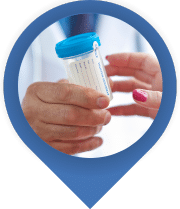The Latest Healthcare News
Check out our blog to learn more from our team about the latest medical advancements, health tips, and primary care news.

If you or a loved one is feeling anxious, hopeless, or disinterested in daily activities, it might be a sign of a mood disorder. These disorders are often linked to a chemical imbalance in the brain, such as low levels of serotonin and dopamine—your body’s “feel-good” hormones. In some cases, your doctor may recommend antidepressants or other psychiatric medications to help manage these symptoms. While medications aren’t a cure-all, they can significantly improve your quality of life.
At AllCare, our compassionate team is dedicated to providing psychiatric medication management (PMM) to ensure you’re on the right dose and fully understand how to take your medication. We’ll take the time to review your symptoms, listen to your concerns, and tailor a treatment plan that fits your lifestyle, ensuring you feel supported every step of the way to recover your behavioral health.
Nearly one in five Americans will experience a mood disorder or mental health condition at some point in their lives. These issues can be difficult to discuss, but many mental health challenges are manageable with the right care. While you might think you need to see a counselor or psychiatrist, your primary care doctor can often provide the support you need.
At AllCare, we believe that every patient’s experience with mental health and medication is unique. That’s why psychiatric medication management is vital, offering benefits such as improved quality of life or lower risk of side effects. Our goal is to provide compassionate, personalized care to support your emotional well-being and help you live a healthier, happier life.

Specialties: Psychiatry
Languages: English
States Licensed: MD, VA, DC

Specialties: Psychiatry
Languages: English
States Licensed: MD, VA, DC

Specialties: Psychiatry
Languages: English
States Licensed: Washington, DC

Specialties: Psychiatry
Languages: English
States Licensed: MD, VA, DC

Our individual therapy sessions provide a safe and confidential space for you to explore your thoughts, emotions, and behaviors. Through personalized counseling, our experienced therapists help you gain self-awareness, develop coping strategies, and navigate life’s challenges to foster personal growth and well-being.

At AllCare, we offer specialized support for individuals dealing with anxiety and depression. Our therapists employ evidence-based techniques to help you manage symptoms, develop healthy coping mechanisms, challenge negative thought patterns, and promote emotional well-being. We provide a compassionate and supportive environment to help you regain control and lead a more fulfilling life.

Our comprehensive psychotherapy services cater to individuals diagnosed with Attention-Deficit/Hyperactivity Disorder (ADHD). Through a tailored approach, our therapists help you develop strategies to manage symptoms, improve focus and attention, enhance organizational skills, and build self-esteem. Our goal is to empower you to thrive academically, professionally, and personally.

Our psychiatry-trained nurse practitioners are here to evaluate your symptoms and determine the best treatment plan for you. Depending on the treatment plan that you agree upon with your medical provider, medications like antidepressants, anti-anxiety, or other psychiatric medications may be prescribed during these visits.

Psychiatric medication management therapy may be beneficial for anyone who:

There are several types of psychiatric medications, each designed to treat different mental health conditions. Here’s an overview of the most common ones:
Antidepressants are used to treat conditions like depression, anxiety disorders, and some chronic pain conditions. They work by balancing chemicals in the brain, such as serotonin, norepinephrine, and dopamine. Common types include SSRIs (Selective Serotonin Reuptake Inhibitors) and SNRIs (Serotonin-Norepinephrine Reuptake Inhibitors).
These medications are prescribed for anxiety disorders, panic attacks, and excessive worry. Benzodiazepines are a common class of anti-anxiety drugs, providing fast-acting relief, but they are usually prescribed for short-term use due to their potential for dependence. Non-benzodiazepine options, like buspirone, are used for long-term anxiety management.
Antipsychotic medications are used to manage symptoms of conditions like schizophrenia, bipolar disorder, and severe depression. They help control symptoms like hallucinations, delusions, and extreme mood swings. There are two main types: typical (first-generation) and atypical (second-generation) antipsychotics.
Mood stabilizers are commonly used for bipolar disorder to help regulate extreme highs (mania) and lows (depression). Lithium is one of the most well-known mood stabilizers, while other drugs in this category include certain anticonvulsants like valproate and lamotrigine.
Stimulants are primarily used to treat ADHD (Attention-Deficit/Hyperactivity Disorder). They help improve focus, attention, and control of impulsive behaviors by increasing levels of certain neurotransmitters in the brain, such as dopamine and norepinephrine. Common stimulants include methylphenidate and amphetamine-based medications.

Psychiatrist medication management is a collaboration between a patient and a doctor to determine the need for psychiatric medications. It includes regular check-ins to monitor the symptoms and side effects of medications, make any necessary adjustments, answer any questions, or address any new or worsening symptoms. The primary goal of PMM is to maximize the benefits to your quality of life while minimizing the risk of medication side effects.
Yes, psychiatrists are medical doctors who are specifically trained to diagnose and treat mental health conditions. One of their primary responsibilities is prescribing psychiatric medications when necessary. Because they have a medical degree and specialized training in mental health, psychiatrists can evaluate a patient’s symptoms, determine the appropriate medication, and adjust treatment as needed.
In addition to prescribing medications, psychiatrists can provide psychotherapy (talk therapy), though some focus solely on medication management and collaborate with therapists or psychologists for counseling services.
Make an appointment with your physician if you experience any of the following symptoms:
There is no set time frame for how long you will be on psychiatric medications. For some, it may only be a short time; for others, it may be a lifetime. Regular check-ups with your doctor can help determine how your medications affect your symptoms and if and when you can stop taking them.
Check out our blog to learn more from our team about the latest medical advancements, health tips, and primary care news.
Seasonal Affective Disorder (SAD) represents a significant mental health concern affecting approximately 5% of adults in the United States. This […]
Read More >Mammograms save lives. Early detection of breast cancer through proper screening will give a patient a remarkable 99% five-year survival […]
Read More >Most people are aware that diet, exercise, and genetics affect cholesterol levels. But can stress raise your cholesterol? The answer […]
Read More >Our related healthcare services extend beyond immediate care to include preventive care such as routine physical exams, chronic disease management for conditions like diabetes, and specialty care referrals for more complex health issues.